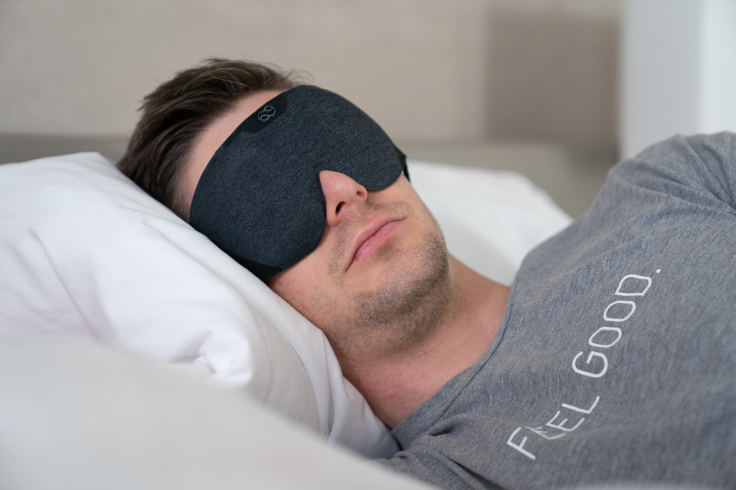Leveraging The Body Clock: How Light Therapy Masks Revolutionize Sleep
Travelers visiting locations outside of their time zone struggle to keep their normal sleep schedule. Many workers also have jobs that disrupt the natural sleep pattern, causing them to have a decreased sleep quality and to feel groggy and tired during waking hours. For graveyard shift workers, one night shift is equivalent to flying to Asia and coming back the next day. All humans experience frustration because of poor sleep as a result of how we want to live our lives. Changes in technology and the healthcare industry and general side effects from the Covid-19 pandemic are responsible for the growing rate of sleep disorders today.

Lumos is tackling this issue with its light therapy mask, which caters to travelers, night shift workers, professional athletes, weekend night owls, and 'super snoozers' (people who hit snooze buttons frequently). The product is a padded mask which has LED bulbs enclosed within it, enabling its users to have bespoke light therapy, which based on research from Stanford University, was able to adjust the circadian clock and potentially reduce the disruption of natural sleep cycles experienced when flying across time zones or working night shifts.
Research has shown that eye masks are beneficial in enhancing alertness and memory retention, the Lumos Mask is likely to improve many employees' lives for the better. "Shifting a sleep schedule without moving time zones can be difficult because the process goes against the body clock or circadian rhythm, that's naturally ruled by sunlight. The Lumos Mask may be a solution for night shift workers to sleep easier on an alternative schedule and remain alert while they are working," says Dr. Biquan Luo, founder of Lumos.
The technology used for the Lumos Mask is based on research by Stanford's Dr. Jamie Marc Zeitzer, a Professor of Psychiatry and Behavioral Sciences (Sleep Medicine) who has dedicated his career to circadian rhythms regulation. His findings, clinically tried by retired astronauts, highlight the impact of light on circadian rhythms.
The possibility of feeling human during their waking hours is very impactful for night shift workers and their clients. Preliminary data from a study conducted by Lumos and funded by the Department of Defence found that doctors who participated felt 33% more alert during their night shifts and 40% less sleepy than usual at the end of their shift. A 5% - 15% increase in their physical, cognitive, and emotional functioning was also noted from mask use. This will likely significantly improve hospital patients' experience and medical outcomes if adopted on a mass scale.
The Lumos Mask is designed to improve users' sleep by helping them to change their sleep schedule through utilizing technologies discovered at Stanford to adjust the body clock through its iOS app. Users input their travel or night shifts into the app and its algorithm will create a light-program within the mask tailored to their schedule, aiming to restore the body's original sleep pattern.
During sleep hours, the mask briefly flashes low-intensity light that penetrates the user's eyelids. Studies from Stanford have shown that these flashes were able to trick the brain into believing it's in a different time zone or a different time.
However, the application of the Lumos Mask goes beyond jet lag and night shifts. Social jetlag, the misalignment between our internal body clock and our social schedule can also be disconcerting and affect our lives in a negative way. This can be caused by many different reasons such as getting up early to take care of toddlers, socializing late on the weekends with an early start during the week, or being a natural night owl with an early rising schedule. As a result of social jetlag, you may hit the snooze button many times before getting up. This can lead to your sleep pattern further being disrupted, leaving you feeling groggy and unfocused. Anyone suffering with social jetlag may also benefit from having a healthy circadian rhythm that is fully aligned with their sleep schedule. Considering the broad impact of social jet lag, the Lumos team is rolling out a Daily Shift feature and a Sunrise Alarm in the Lumos Mask to help combat this issue.
Commenting on Lumos's company mission, Dr. Luo said, "Sleep is a fundamental part of our health and wellbeing, but it shouldn't stand in the way of people making choices and having aspirations. For example, if you want to travel around the world, you should be able to enjoy your trip and make the best out of it without the burden of jet lag. If you want to become a healthcare professional, you should be able to do that without worrying about the negative impact of night shifts on your health. That's why Lumos is on a mission to liberate people from the constraint of circadian rhythms, so they can live life fully and achieve their goals."
The reported distress of those unable to rest properly highlights how essential it is in a digital age, to apply advanced technologies to support our lifestyles and allow for greater freedom of choice. Once emerging products like Lumos' sleep mask are more commonly used, people will have access to a non-invasive process of furthering their capabilities beyond biological constraints. Ultimately, regardless of lifestyle, everyone can benefit from having a healthy circadian rhythm.





















